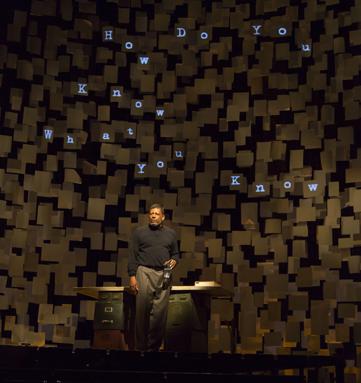Play
by August Wilson
Co-conceived and Directed by Todd Kreidler
Creative Consultant Constanza Romero
Featuring Eugene Lee
Huntington Theatre Company
Boston University Theater
Symphony Hall area, Boston
March 5 – April 3, 2016

in “How I Learned What I Learned”
Photo: Josh Lamkin Photography
Courtesy of Huntington Theatre Company
Perched in front of a simple though very effective background composed of endless pages of paper suspended on the back wall of the set all the way to the rafters, Eugene Lee, over the course of the uninterrupted hour and forty minutes of this stirring production, details events and recounts tales that contributed to the person and artist that August Wilson became. It is a tour de force performance, full of detail, humor and intense reflection on racism in America, thoroughly engaging and a fulfilling portrait of the late great American playwright.
Projected upon various of the paper sheets at intervals throughout the show are titles corresponding to each segment’s subject-matter, each letter tapped out in sequence with sonic enhancement to simulate the action of a typewriter, simply but effectively.
At the outset, My Ancestors is the message projected, and Lee as Wilson (hereafter Lee/Wilson) details the history of his family’s emigration from North Carolina to Pittsburgh in the 1930s to settle in the region known as the Hill District.
At one point, Lee/Wilson throws off his top layer showing a T-shirt with the phrase I am supposed to be white emblazoned on it, making a passing gag about getting it on eBay from Clarence Thomas. It’s a humorous contribution to a series of reflections about African-American identity that persists throughout the piece, punctuated at beginning and end by a moving quotation about blackness not being an accident of nature but a natural adaptation with great destiny.
Funny and moving stories of all sorts abound.
Speaking of the Hazelwood community in Pittsburgh in the 1950s, Lee/Wilson invokes the violent negative reaction shown by some whites there followed by the response by the local Catholic Monsignor to state the wrongness of that reaction, and the subsequent shockingly ignoble firing of the Monsignor in the wake of the resulting effect of vastly reduced donation income to the parish.

With a wry tone, Lee/Wilson remembers how, in the Hill District in the riots of 1968, a local grocery store with a particularly repugnant management is burned down. In an apparent show of satisfaction, Wilson’s picture is taken in front, though he makes the point forthrightly but with some irony that he didn’t burn it himself.
Leaving school at fifteen, Wilson becomes a regular library hound and finds himself falling in with a crowd of poets, artists and painters by whom he is deeply influenced.
None of that earns him a living, however, and several sections follow in which Lee/Wilson accounts for various, usually aborted, attempts to maintain a job. Sadly, most of the cases of employment that Wilson describes involve a compromise of his integrity, almost always for reasons of racism, and typically, in one case after another, he quits in angry and defiant rebellion.
Hired to work in a stock-room of a toy-store, Wilson is subjected to the indignity of having his prospective boss threaten him with violence if he were to be caught stealing anything. In response, Wilson responds simply: I quit motherfucker.
After being employed by a yard-maintenance company, Wilson is cutting the grass at a residence where the white owner demands that the foreman take Wilson off her yard. Concerned about payment, the foreman complies. Again, mortified, Wilson quits.
Brought on as a dishwasher, Wilson is accosted by his employer for returning from lunch from the library twenty seconds too late. Again, his honor challenged, Wilson defiantly throws in the towel.
There’s a great story about Wilson’s mother winning a supposedly new washing machine from a contest. When, however, the people who are running the contest find out that Wilson’s mother is black, they only agree to fund a used machine. Wilson’s mother declares to him that something is not always better than nothing, rejects the offer of the used machine, and begins to save nickels and dimes towards her own purchase of a new machine, which she does proudly and successfully within a year and a half.
Wilson pays special tribute to some of his early artistic influences, from his neighborhood and beyond. The Hill Arts Society, home of painters and poets, becomes a kind of second home for Wilson.
He cites, in particular, Barbara Peterson, his next door neighbor in Pittsburgh, a painter, who, though she dies very young at forty-two, had risen to become the head of the art program in the Pittsburgh schools. A poet and junkie named Charley Wiliams, protective of Wilson, keeps him away from dope despite his own addiction. He also introduces him to a fellow who, despite artistic pretensions, plays the saxophone not at all well. Witnessing the fellow’s incapacity, Wilson is struck by the need to train himself thoroughly in his own chosen art of writing, telling himself to learn to do it if you really want to be a writer.
A significant tribute to the late great saxophone player John Coltrane follows. Lee/Wilson describes, in 1966, passing a place called the Crawford Grill where Coltrane is playing to a crowd of two hundred assembled outside just to get a taste of the master’s art; sadly, Coltrane dies the following year at thirty-nine.

in “How I Learned What I Learned”
Photo: Josh Lamkin Photography
Courtesy of Huntington Theatre Company
Early problematic romantic encounters become the subject of lively and entertaining reminiscences.
Near the end of the play is another sad account of the now recognized playwright Wilson cashing a check from a theater, the Mark Taper Forum in Los Angeles, at a bank there, only to encounter a bank teller, lying about not having an envelope to put his cash in. Again, even while experiencing success, Wilson witnesses racism, noting, yet again, It’s not about the envelope, it’s about demanding respect.
This moving collage of episodes from the playwright’s mostly early life is punctuated at the end by a projected detailing of his numerous works for the stage, the evidence of his success simply heralded as the capstone of a story about a young black man trying earnestly to make his way in a world that seeks in so many ways to subvert his integrity. The testament of this charming and moving show is the cumulative sense of how, despite those challenges, this talented and hard-working young man becomes a recognized artist and a heralded voice of his generation.
– BADMan
Leave a Reply